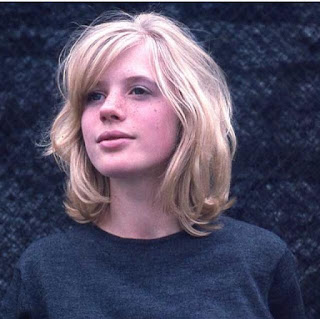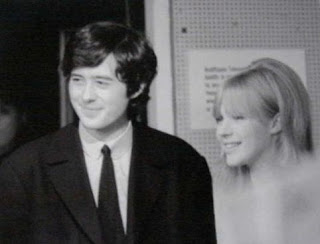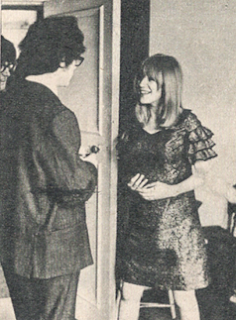ELIZABETH WINDER: “Marianne and John Dunbar honeymooned in
Paris – but they never saw Montmartre, or the roses of Places des Vosges, or
the sailboats in Jardin du Luxembourg.
The Beat poets were in town, and John invited them to crash the
honeymoon. Soon Allen Ginsberg, Gregory
Corso, and Lawrence Ferlinghetti were knocking at their door at the Hotel de
Lausanne, bearing jobs of abominably cheap rose. They made themselves at home – shooting up,
throwing up, and raving about everything from Rimbaud’s haircut to young boys
in Tangier. Needless to say, hardly a
magical springtime in Paris. Instead of
candlelit dinners at Le Grand Vefour, there was Ferlinghetti eating baguettes
in their bed. Instead of evenings at the
opera or Club Saint Germain, Allen kept them up all night ranting about the
Rosenbergs. Instead of breakfasting on
croissants at Café de Flore, Corso mixed up his morning Brompton cocktail –
half morphine, half cocaine, followed by an eight-hour nap on the floor.”
Friday, August 21, 2009
Before The Poison
MARIANNE FAITHFULL: “I was born in Hampstead. My mother wasn’t screaming so they didn’t believe she was in labor. Later I went to convent school. Later I rode in leather. Later I took some sleeping pills. I needed to lose…”
MARIANNE FAITHFULL: “It was tremendously strict at the
convent. We learned nothing about the
outside world. After we bathed we
quickly got into shifts, because it was thought shameful for us to look at our
bodies. If heaven can impose that kind
of restrictive practice, hell can look tempting. We were not only virgins, we were absolutely
virginal. The one thing you come out
with is a very strong conscience.”
A.E. HOTCHNER: “Reading’s only glamorous denizen was Marianne’s mother, the Baroness Eva Sacher-Masoch, who lived as grandly in her cottage as her penurious circumstances would permit. The exotic baroness had come from Austria to Britain when she married an eccentric Englishman named Glyn Faithfull, but the marriage ended when Marianne was six years old. Since then, the baroness had concentrated all her time and energy on schooling her only child in music, painting, literature, and even took her back to Vienna one summer to acquaint her with the beauty and culture of the city where her forebears had been born, a royal lineage dating back to Charlemagne.”
MARIANNE FAITHFULL: “As a girl, I was taught absolutely everything. I was taught dancing and music and singing and piano, all those things, for some unspecified career, probably movies, I think that’s what my mother really would have liked me to do, because that had been her ambition when she was a young beauty. One of the things I used to do when I was at school at the convent was fill pages and pages of my workbook with ideas for pen names or stage names. This was before I realized that my own name was actually the best possible name.”
MARIANNE FAITHFULL: “I was just a typical child of my time, I guess – open to everything. The names of Sartre, and Simone de Beauvoir, Celine, Camus and Kafka were in the air. I repeated their ineffable names like a catechism. I devoured papers for every scrap of hipness and outrage I could find. Articles about Brigitte Bardot and Juliette Greco. I used to come up to London from school and go to clubs when I was about sixteen. I’d go to the Marquee and the Flamingo, jazz clubs. People like Zoot Money and John Mayall and Nina Simone played there. The audiences were pretty scruffy. Students and beatniks and a scattering of older jazz aficionados. I liked jazz, and I was dazzled by this scene, rudimentary as it was. It was all connected to hipness. I wanted to smoke Gauloises and drink black coffee and talk about absurdity and maquillage with wicked women and doomed young men.”
STEPHEN DAVIS: “Conversation died when Marianne walked into the room. Girls like her, Scott Fitzgerald wrote, ‘do all the breathing for everyone, and finally even the men have to go outside for air.’ She was a dreamy vision of Anglo-European drop-dead beauty: long blond hair, eyes like blue ice, a ‘large balcony,’ and full, inviting lips plumped like downy pillows. Marianne was also educated, well read, and highly intelligent, and her innocent gaze fell on a man like a heat wave… Her mother was a war refugee with an obscure Austro-Hungarian title – Baroness Erisso – the granddaughter of Leopold von Sacher-Masoch, whose 1870 novel ‘Venus in Furs’ inspired the term ‘masochism’ for pain-is-pleasure syndrome. She was raised at her professor father’s estate, Brazier’s Park, in Oxfordshire.”
MARIANNE FAITHFULL: “Ever since my days at the convent my secret heroes had been decadents, aesthetes, doomed Romantics, mad bohemians and opium-eaters.”
MARIANNE FAITHFULL: “John Dunbar was the epitome of the tormented youth of Romantic tales. He was very nihilistic and, like a Dostoyevskian hero, would talk breathtakingly about killing himself. All of which I found terribly attractive and a little frightening. I was to be his muse. I thought if he had me he couldn’t possibly kill himself. John was into bebop jazz. Coltrane, Charlie Parker and Beethoven’s late quartets and Mozart and black music and all that great stuff. He was my Pygmalion and I was more than ready for all that. I soaked it up like a sponge.”
PETER ASHER: “John called me and said he’d met this extraordinary girl and was desperately in love. She was so beautiful and amazing and I had to meet her. So I did and everything he said was true. I thought, Boy, John’s really scored. She’s totally gorgeous. Intelligent. Perfect in every way.”
MARIANNE FAITHFULL: “I married John Dunbar in May of 1965 in Cambridge. I was eighteen and he was twenty-two. We walked through the fields around Cambridge picking wildflowers. I had started to cry because I’d forgotten to get a bouquet and John went out and picked a big bunch of light May blossoms and gave them to me. And they had great long black thorns on them. It was all so beautiful and enchanted. But as it turned out, it was the wrong kind of magic. It’s very bad luck, you see. May blossom belongs to Pan and is one of those bewitched flowers. Still, the wildflowers were beautiful (if not propitious) and it was a glorious day. He was great, John, whatever Bob Dylan said about him. So there.”
MARIANNE FAITHFULL: “I wouldn’t have married John Dunbar if I hadn’t been pregnant. I don’t think John wanted to get married, either. It was a shock. John wasn’t a very conventional person at all. He really didn’t want to particularly lead that kind of life. But he did love me, so he didn’t mind marrying me, and in a way I think he thought it was the only way to pin me down. Because I was very much on the verge of realizing my power, and I think I was frightened of it too. I thought that getting married would tie me to the ground a bit. I needed to touch the hand of reality, yes, I really did. And I did want the baby. I was trying to become respectable, I think. I was looking for myself, who I really was. And getting married meant I was also fulfilling what I was expected to do. I really wanted to please too much. I wanted to be what people wanted me to be.”
BARRY MILES: “When Better Books was sold and its experimental extracurricular activities were threatened, I got together with art critic John Dunbar to plan a new bookshop/art gallery. Dunbar was married to Marianne Faithfull, and his best friend was Peter Asher of the pop duo Peter and Gordon. Together Asher, Dunbar and I formed a company called MAD Ltd, to start an experimental art gallery and bookshop that would continue the work of Better Books and show avant-garde art. It was to be called Indica. Both Peter and his sister, the actress Jane Asher, still lived at home in a large house on Wimpole Street. Jane’s boyfriend, Beatle Paul McCartney, also lived there in a small maid’s room in the attic. Through Peter, Paul soon became involved in planning the new Indica bookshop and gallery.”
JOHN DUNBAR: “There was a big event in the Albert Hall that got out of hand – ‘Beat Poetry in the Albert Hall’ with Allen Ginsberg. Six thousand people came and watched it. And I thought, well, if six thousand people can watch this, you can probably do a book shop and gallery. That’s how I started my bookstore. Thousands of people just wanted to have a good time. It was nothing else. They were all on the street – what I had was a combination bookstore and art gallery. It became a great hangout for the writers and pop artists of the sixties. The art I exhibited was pretty weird – moving things, undulating sculptures, op art of all kinds. Yoko Ono doing her sort of things. In fact, I introduced Yoko to John Lennon. Lennon used to come into the gallery quite often – he was a pal – I knew him from around the clubs, the Ad Lib and these funny odd places. Yoko was one of the artists I exhibited. Icky stuff – a frame on the ceiling with a stepladder. That kind of thing. I thought John would like her so I invited him to one of her openings and got them together. I don’t think he liked any of her stuff but he bought one anyway.”
MARIANNE FAITHFULL: “I would have liked it if John [Dunbar] had gone on living at Cambridge. If that had happened, I would have missed the whole thing. But that’s what I really wanted: the sort of lovely, scholar’s wife life at Cambridge University. I would have loved it.”
ANDREW LOOG OLDHAM: “The moment I caught sight of Marianne I recognized my next adventure, a true star. In another century you’d have set sail for her; in 1964 you’d record her... She had this fantastic virginal look. I mean, at a time when most chicks were shaking ass and coming on strong, here was this pale, blonde, retiring, chaste teenager looking like the Mona Lisa, except with a great body. I didn’t care whether she could sing or not – I could sell that look – and I’d learned what miracles can be achieved by clever engineers in a recording studio. And what a name – Marianne Faithfull! You can’t make up a better name than that.”
TONY CALDER: “When Marianne walked in, it was as though someone had turned the volume down slowly, the place went into a hush. Andrew said, ‘I’ve got to have her,’ Mick said, ‘I’ve got to have her.’ Chrissie Shrimpton said, ‘No you fucking don’t,’ and Sheila Oldham said, ‘Leave her alone.’ Andrew says, ‘No, I’m talking professionally.’ It was one of the most stunning sights seeing this girl come through the door.”
MARIANNE FAITHFULL: “At the time I went with John Dunbar to the Stones party, I was very pretentious about pop music, and looking at Mick and Keith and the rest of them, I thought, my God, what truly awful people. Awful, mind you, but a bit fascinating, especially Andrew Oldham, who was wearing feminine silks and had makeup on. They took notice of me, particularly Andrew – even though I was only a shy girl of seventeen from a convent in a little town. I was pretty in that very strange way of a very young girl who doesn’t really know about it yet, which is incredibly captivating. And I looked very different from everyone else, I think, because I wasn’t dressed up and I wasn’t made-up, either. And, also, I was very, very still. I picked that up from the nuns, I think. That business of not really showing your hands, keeping very still and moving sort of all in one piece.”
KEITH RICHARDS: “Usually when first you said hi to Marianne you started talking to the cleavage. And she knew she was thrusting it. A naughty lady, bless her heart.”
SPANISH TONY: “Though I was still young, I had known many beautiful women intimately… But I had never in my life seen, far less spoken to, a woman of such perfection as Robert Fraser was sharing a joint with then I dropped into his apartment that night. He had introduced her as Marianne Faithfull, and the name meant nothing. She wore just ragged old Levi’s and a shirt so tight that her breasts were clearly visible through the thin material. She was the first woman I had met who didn’t wear a bra. Yet she somehow still looked virginal, with her cornflower blue eyes and ready smile. Though she looked very young she spoke authoritatively with Robert about contemporary artists and sculptors while I got off on the sound of her deep, sensuously husky voice.”
SPANISH TONY: “If Anita was as alluring and mysterious as night, Marianne Faithfull was as blithe and pure as a midsummer’s day.”
JOHN DUNBAR: “Marianne was just too young to make a go of our marriage. So was I. It was such a manic time. Not only was she having a music career and all that, but she was also trying to be good about the kid and cooking and housekeeping, but I was totally into the gallery and a lot of lunacy. Up all night, and all the time commotion, commotion. The two of us not home much, doing our separate things. So after a year or two of that, it wasn’t really surprising that we just couldn’t make it together. It was a choice that I had to make – either to devote my life to keeping Marianne together or to my own career.”
JOHN DUNBAR: “Before she got into smack and all the other drugs, her big kind of ‘out’ was to spend money. She’d got into clothes shops and just buy mountains of stuff she’d never wear, thousands of pounds. Lunatic jags. She was making loads of loot but was always in debt, so unnecessary. It was just clothes, clothes, clothes, which I think she even started hiding somewhere outside the house. That was hard to take when we were struggling to get along. That pissed me off. Of course, I could have devoted my life to looking after Marianne, getting her off the clothes kick, keeping a sharp eye on her, but I was as selfish and young as she was and I wanted her to pay attention to me. If I’d been ten years older than her, then maybe – who knows?”
MARIANNE FAITHFULL: “The dolly girls all jiggled and jumped up and down and shook their moneymakers, doing little go-go steps in their thigh-length white boots. I didn’t want to compete with that, so I decided to go as far as I could in the other direction. I simply stood there in front of the microphone, very still, my hands dangling by my side and sang from some place deep inside me and out came this clear, ethereal voice. It wasn’t the least sexy or hip. It was about as far as you could get from sexy.”
ANDREW LOOG OLDHAM: “She was unique, sort of like Grace Kelly and a slut once she allowed you to get to know her. Four hits in ten months and we shoved her out there touring the toilets of England, and she survived that too.”
MARIANNE FAITHFULL: “At a time when my life as a grown-up should have begun, I was still very much a child. And everything that has happened to me, it’s as if it happened to a child. All my attempts at growing up were really no more than a child’s make-believe. Convent girl reading forbidden books in the loo, budding bohemian, pop star, wife, mother. Between the ages of seventeen and nineteen I shed any number of old lives and grew new ones overnight without any of them seeming quite real to me; I discarded them as cavalierly as a child who moves from one game to another. Pursued in earnest, any one of these might have led to a reasonably happy life. But then again, I wasn’t interested in happiness. I was looking for the Holy Grail.”
ANDY WICKHAM: “Angel blonde hair swirling in the wind… large wide eyes, grey and distant… heavy sweater, mittens, nose pressed against the window of a large department store… long evening gown, and wine, clear and red… a large, silver ring… a little girl alone on a windy common… her dog… a Dalmatian called Sara… the elegant, sophisticated young panelist on the TV programme… laughter, frothy coffee, Joan Baez on the record player… riding in the park… a large white mare with sad eyes, head proudly raised… a small white figure on a large empty stage… darkness… sunshine… the cloistered solitude of a small Convent… the clinical mechanism of a recording studio… Byron… Bob Dylan… the haunting rhythm of a twelve-string guitar… the vibrant sensuality of a Fender bass… sunset on a lonely sea… the wind in the trees… the wistful beauty of Giselle… the wild spontaneity of a Rolling Stones concert… chattering on the telephone to her favourite girlfriend… the luxury of buying expensive cigarettes… the loneliness of a hotel room… the gunfire of applause… this is Marianne Faithfull.”


























































































































